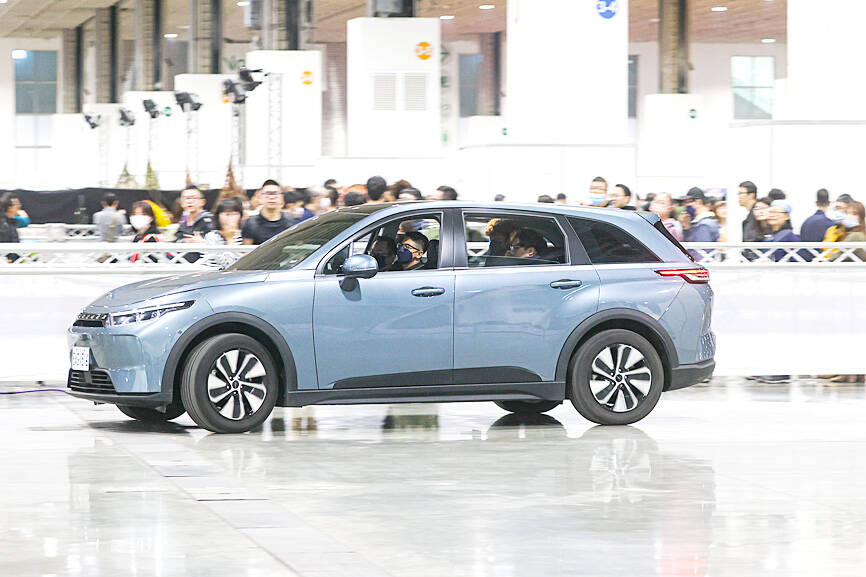Yulon Motor Co (裕隆汽車) yesterday released a positive growth projection for revenue this year, thanks to increasing shipments of its first electric vehicle (EV) model based on the MIH Open EV Platform developed by Hon Hai Precision Industry Co (鴻海精密), also known as Foxconn.
Yulon started shipping the electric sports utility vehicle Luxgen n7 earlier this year with shipments totaling 500 units in the first quarter, Yulon Motor spokesman Steven Lo (羅文邑) told investors during a virtual conference.
“In March and April, we expedited shipments to 1,200 to 15,000 units a month,” Lo said. “With higher shipments from the second quarter, we expect to complete the 9,000 Luxgen n7s in preorders by the third quarter.”

Photo: CNA
Yulon manufactures the electric vehicle while its subsidiary, Luxgen Motor Co (納智捷汽車), sells it. Luxgen has received about 20,000 n7 preorders since September 2022 and plans to accept second-wave orders from next month or June, Lo said.
Luxgen n7 is designed and based on the Model C EV developed by Foxtron Vehicle Technologies Co (鴻華先進), a joint EV venture between Hon Hai and Yulon.
“We are positive about the company’s revenue outlook, with Luxgen n7 being a major highlight of the year,” Lo said.
He said Yulon and Luxgen are discussing plans to introduce new EV models later this year, but did not elaborate.
Hon Hai last month said the new-generation Model B electric car, also designed by Foxtron, would be ready for mass production and open for preorders at the end of this year.
Regarding speculation that Yulon might distribute Chinese EVs made by BYD Co (比亞迪) and Chery Automobile Co (奇瑞汽車) in Taiwan, Lo said the company does not rule out any possibility of making vehicles for other brands, but has no substantial plans to partner with Chinese companies.
Yulon’s consolidated revenue last year expanded 6.54 percent to NT$82.12 billion (US$2.53 billion) from NT$77.08 billion in 2022, partly helped by its auto financing business operated by another subsidiary, Taiwan Acceptance Corp (裕融). Net income improved to NT$8.04 billion last year, reversing a loss of NT$469 million the previous year.
Lo said Yulon’s gross margin this year should stay at a similar level to last year when it fell slightly to 35 percent from 36 percent in 2022.

‘SWASTICAR’: Tesla CEO Elon Musk’s close association with Donald Trump has prompted opponents to brand him a ‘Nazi’ and resulted in a dramatic drop in sales Demonstrators descended on Tesla Inc dealerships across the US, and in Europe and Canada on Saturday to protest company chief Elon Musk, who has amassed extraordinary power as a top adviser to US President Donald Trump. Waving signs with messages such as “Musk is stealing our money” and “Reclaim our country,” the protests largely took place peacefully following fiery episodes of vandalism on Tesla vehicles, dealerships and other facilities in recent weeks that US officials have denounced as terrorism. Hundreds rallied on Saturday outside the Tesla dealership in Manhattan. Some blasted Musk, the world’s richest man, while others demanded the shuttering of his

Taiwan’s official purchasing managers’ index (PMI) last month rose 0.2 percentage points to 54.2, in a second consecutive month of expansion, thanks to front-loading demand intended to avoid potential US tariff hikes, the Chung-Hua Institution for Economic Research (CIER, 中華經濟研究院) said yesterday. While short-term demand appeared robust, uncertainties rose due to US President Donald Trump’s unpredictable trade policy, CIER president Lien Hsien-ming (連賢明) told a news conference in Taipei. Taiwan’s economy this year would be characterized by high-level fluctuations and the volatility would be wilder than most expect, Lien said Demand for electronics, particularly semiconductors, continues to benefit from US technology giants’ effort

TIGHT-LIPPED: UMC said it had no merger plans at the moment, after Nikkei Asia reported that the firm and GlobalFoundries were considering restarting merger talks United Microelectronics Corp (UMC, 聯電), the world’s No. 4 contract chipmaker, yesterday launched a new US$5 billion 12-inch chip factory in Singapore as part of its latest effort to diversify its manufacturing footprint amid growing geopolitical risks. The new factory, adjacent to UMC’s existing Singapore fab in the Pasir Res Wafer Fab Park, is scheduled to enter volume production next year, utilizing mature 22-nanometer and 28-nanometer process technologies, UMC said in a statement. The company plans to invest US$5 billion during the first phase of the new fab, which would have an installed capacity of 30,000 12-inch wafers per month, it said. The

Minister of Finance Chuang Tsui-yun (莊翠雲) yesterday told lawmakers that she “would not speculate,” but a “response plan” has been prepared in case Taiwan is targeted by US President Donald Trump’s reciprocal tariffs, which are to be announced on Wednesday next week. The Trump administration, including US Secretary of the Treasury Scott Bessent, has said that much of the proposed reciprocal tariffs would focus on the 15 countries that have the highest trade surpluses with the US. Bessent has referred to those countries as the “dirty 15,” but has not named them. Last year, Taiwan’s US$73.9 billion trade surplus with the US